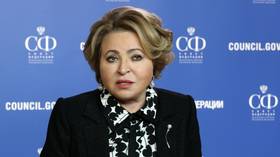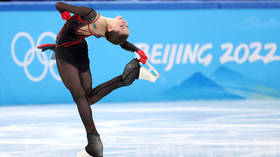Spies possibly behind Valieva scandal – top senator

The ongoing saga of Kamila Valieva – the 15-year-old Russian figure skater accused of failing a drug test ahead of the Beijing Olympics – smells of meddling by “you know which” secret services, top Russian senator Valentina Matvienko told reporters on Friday.
“Why did the story initially appear as a rumor in some Western media, rather than an official statement,” Matvienko said in Moscow. “This is at the very least strange.”
“In my opinion, more clarity was added by recent overseas statements, from which it is clear they are trying to tie this story to the Rodchenkov Act. We remember who was behind it then, and understand now that all this is beginning to look like manipulation by special services – you know which ones,” she added.
The Rodchenkov Act was passed by the US Congress in 2019. Named after Grigory Rodchenkov – the disgraced Russian scientist who fled to the West and claimed to have been involved in state-sponsored doping of athletes – it allows Washington to sanction countries accused of participating in doping schemes.
Matvienko added that Russia’s lawyers will “prove the absurdity” of the doping allegations against Valieva. As chair of the Federation Council, the upper house of the Russian legislature, she is the third-highest official in Russia after the president and the prime minister.
The Kremlin has also backed the skater. “We absolutely, overwhelmingly support Kamila Valieva in any case, and we urge everyone to support her,” presidential spokesman Dmitry Peskov said on Friday.
“Kamila, don’t hide your face. You are Russian. Walk proudly and, most importantly, compete and defeat everyone!” he added.
Valieva made history on Monday, when she became the first female skater to ever land a quadruple jump at the Winter Olympic Games. She did it twice during a free skate routine, and then went on to help the Russian Olympic Committee team win a gold ahead of the US and Japan.
The very next day, it was reported that Valieva had tested positive for trimetazidine, a heart drug not considered a performance enhancer but nonetheless banned by the World Anti-Doping Agency (WADA). The Russian Anti-Doping Agency (RUSADA) immediately suspended Valieva, but she won an appeal on February 9 and continued to compete. The WADA is now seeking to overturn the appeal and bar her from further participating in the Olympics.
The Russian Olympic Committee president, Stanislav Pozdnyakov, has raised questions about the timing of the report and the time it took to process Valieva’s sample – noting it had been submitted in late December, but not processed by the WADA-accredited laboratory in Sweden until February, long past the WADA’s own 20-day deadline.
“I can’t remember any previous situation when it took so long for a result,” Pozdnyakov said on Friday.














